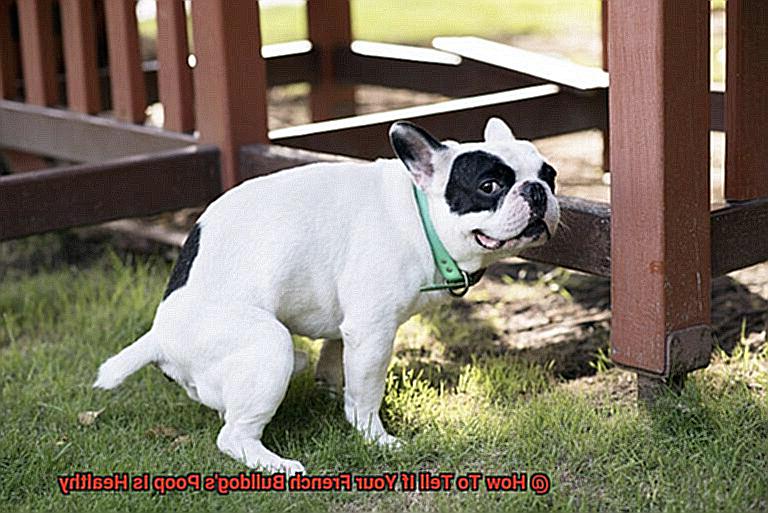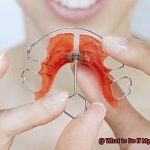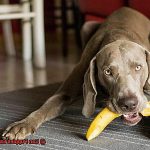How To Tell If Your French Bulldog’s Poop Is Healthy?
Do you ever wonder if your French Bulldog’s poop is healthy? It can be hard to tell, but there are some key signs that you can look for.
In this blog post, we’ll cover the basics of what to look out for when it comes to your pup’s pooping habits.
From the color and consistency of their stool to the frequency of their bowel movements, we’ll go over everything you need to know in order to make sure your pup is healthy and happy.
So grab a snack and let’s get started on understanding how to tell if your French Bulldog’s Poop is clean.
What Does Healthy French Bulldog Poop Look Like?
Contents
- 1 What Does Healthy French Bulldog Poop Look Like?
- 2 What Should You Be Looking For In Healthy Dog Poop?
- 3 How Do I Know If My Dog’s Poop Is Healthy?
- 4 What Does Unhealthy Dog Poop Look Like?
- 5 Causes of Unhealthy Dog Poop
- 6 Possible Treatments for Unhealthy Dog Poop
- 7 Tips on Keeping Your French Bulldog’s Poop Healthy
- 8 Is It Normal for French Bulldogs to Have Runny Poop?
- 9 Conclusion
A clean French Bulldog poop is essential for the health and happiness of your pup.
It should be a medium-brown color, like a perfectly brewed cup of coffee, and have a slightly firm consistency.
The smell should be mild, like a freshly baked muffin, not overpowering.
The size should be consistent – like clockwork – not too large or too small.
When you take a closer look, there should be no signs of mucus, blood, or parasites – just like a clear blue sky without clouds.
Lastly, there may be some undigested food particles in the stool, but not too much – think of it as sprinkles on an ice cream sundae.
What Should You Be Looking For In Healthy Dog Poop?
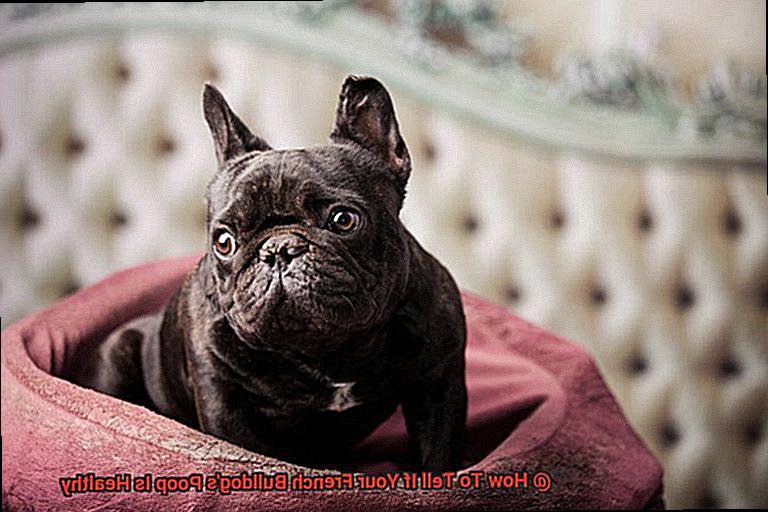
Take a closer look at their poop. It can tell you a lot about what’s going on inside their body.
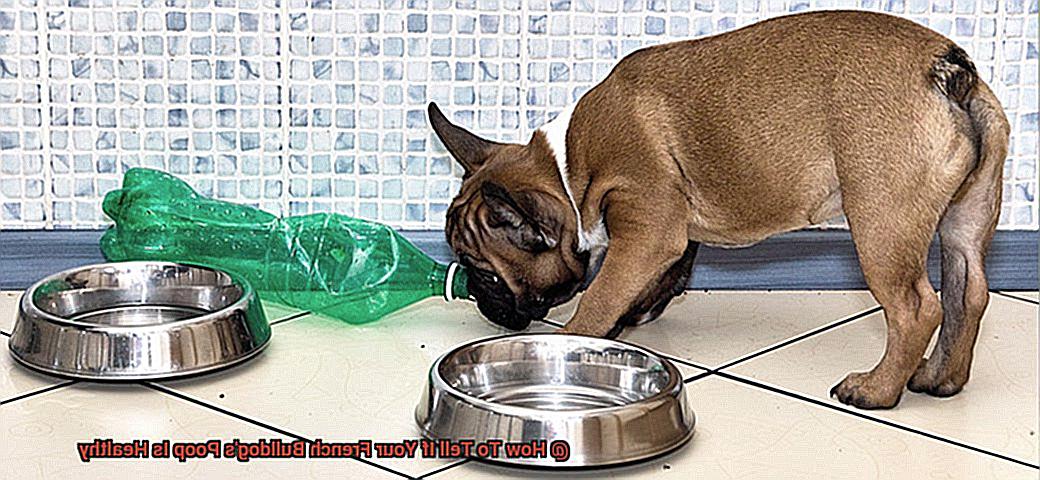
So, what should you be looking for in healthy dog poop?
The key indicators of healthy dog poop are its firmness, dark brown color, and mild odor.
It should also break apart easily when picked up.
Small amounts of undigested food particles, like vegetables or grains, are normal.
If there is an excessive amount of mucus or blood in the poop, it could be an indication of an infection or other health issue.
Healthy dog poop should also be free of parasites, worms, and other contaminants.
You may also notice small amounts of white foam in the stool; this is caused by bacteria breaking down food in the digestive system and is nothing to worry about.
If your pup’s poops check all these boxes, then they’re probably doing just fine. Keep an eye out for any changes in color or texture so that you can spot any problems before they become serious.
How Do I Know If My Dog’s Poop Is Healthy?
The answer might surprise you.
Healthy French Bulldog poop should be firm and well-formed, with a texture similar to Play-Doh.
It should also have a brownish hue and have a mild smell.
But if your pup’s poo looks or smells off, it could be an indication of something wrong.
For instance, if the poop is very soft or runny, it could be an indication of diarrhea or an intestinal infection.
If the poop is black or tarry in color, it could mean that your pup has ingested something like blood or bile – which can indicate an internal problem such as gastritis or ulcers.
If the poop is unusually pale in color, it could mean that their digestive system isn’t absorbing nutrients properly – which can indicate malabsorption or pancreatic insufficiency.
Lastly, if the poop contains white specks or worms, it may be a sign of parasites such as roundworms or tapeworms.
What Does Unhealthy Dog Poop Look Like?
If your pup’s poop isn’t up to par, it could be a sign of an unhealthy stomach.
Dog poop comes in all shapes and sizes, but if it isn’t looking like normal, there may be an underlying problem.
Unhealthy dog poop can vary from loose and watery to hard and dry.
It may also have streaks of yellow, green, or even black.
Additionally, mucus, blood, or other foreign material may be present in unhealthy dog poop.
The smell can be strong and unpleasant – not something you’d want to wear as a perfume.
When it comes to your pup’s wellbeing, don’t ignore the importance of their poo.
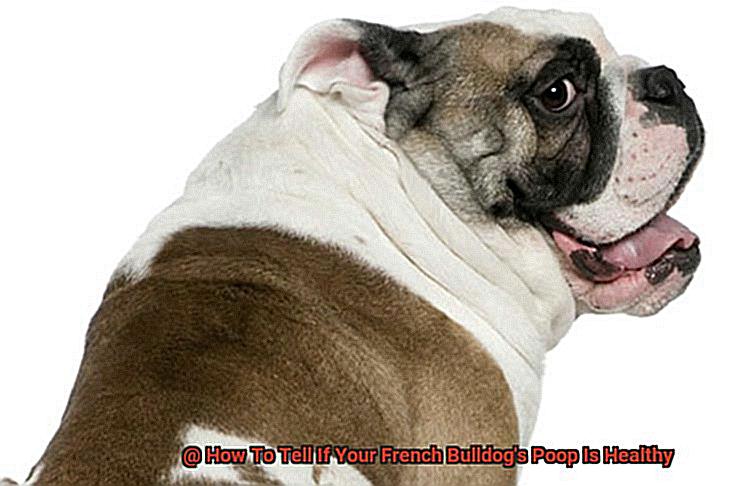
It can be like a fingerprint of their general health status – so pay attention to what you’re scooping up. If you find any changes in your dog’s poop that don’t look right for their breed, please see the vet as soon as possible.
Causes of Unhealthy Dog Poop
Unhealthy dog poop is a common issue that can be linked to various causes.
Just like humans, dogs need the right diet, free of parasites and viruses, and stress-free to maintain healthy poops.
Poor nutrition is often the culprit behind unhealthy dog poops.
If your pup isn’t receiving the necessary vitamins, minerals, fiber or fat in their diet, they may not be able to properly digest their meals.
This can lead to hunger and swollen stools.
Parasites are another potential source of unhealthy dog poop.
These pesky critters can be contracted from contaminated food or water and cause a great deal of disruption in your pup’s digestive system – resulting in unhealthy poops.
Infectious or bacterial infections can also be responsible for unhealthy dog poop.
Such infections are usually caused by contact with other infected animals or coming into contact with polluted soil or water.
Food allergies are yet another potential cause of unhealthy dog poops.
Your pup may have an allergy to certain ingredients in their diet such as grains or proteins which can lead to digestive problems and unsanitary stools.
Lastly, stress is one more reason for unhealthy dog poop that owners should consider looking out for.
Possible Treatments for Unhealthy Dog Poop
Unhealthy dog poop can be a sign that something is amiss in your pup’s digestive system.
Fortunately, there are treatments available to help your furry friend return to their happy, healthy self.
First, you’ll need to determine the underlying cause of the unhealthy poop.
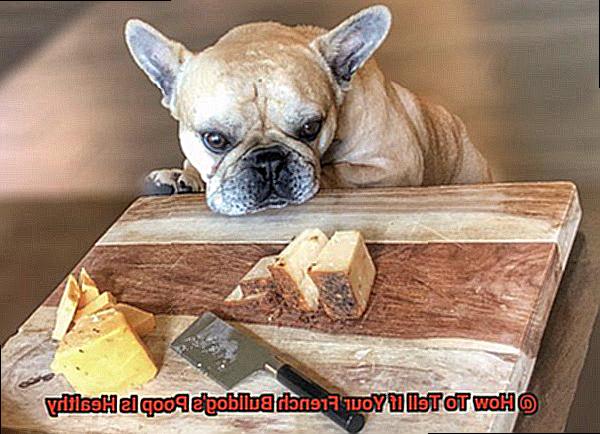
Common culprits may include dietary changes, viruses, parasites, or medical disorders.
Once you know what it is, you can begin focusing on treatments.
For dietary issues, switching to a more nutrient-dense food or adding more fiber to the diet may help improve digestion and reduce digestive problems that lead to unhealthy poop.
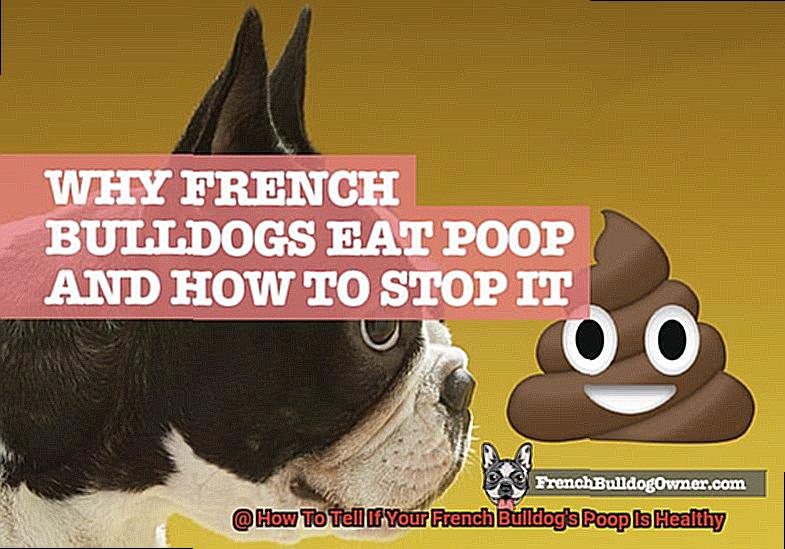
Probiotics can also be included in the diet which may improve digestion and gut health.
If an infection or parasite is present in the dog’s body, medications such as antibiotics and anti-parasitic drugs may be prescribed by your veterinarian.
Digestive enzymes, probiotics, and vitamins can also be beneficial for improving digestion and reducing digestive problems that cause unhealthy poop.
In addition, regular deworming should be done as part of a preventive measure against parasites which can lead to unhealthy dog poop.
Tips on Keeping Your French Bulldog’s Poop Healthy
Maintaining your French Bulldog’s Poop is essential for their overall health and wellbeing.
Here are 8 tips to ensure that your furry friend’s poop stays healthy and clean.
Feed Them Properly
To keep your French Bulldog healthy and happy, feed them a balanced, high-quality diet with the right amount of protein, fat, and carbohydrates appropriate for their height and age.
Avoid giving them too many treats or table scraps as this can lead to digestive issues.
Exercise Regularly
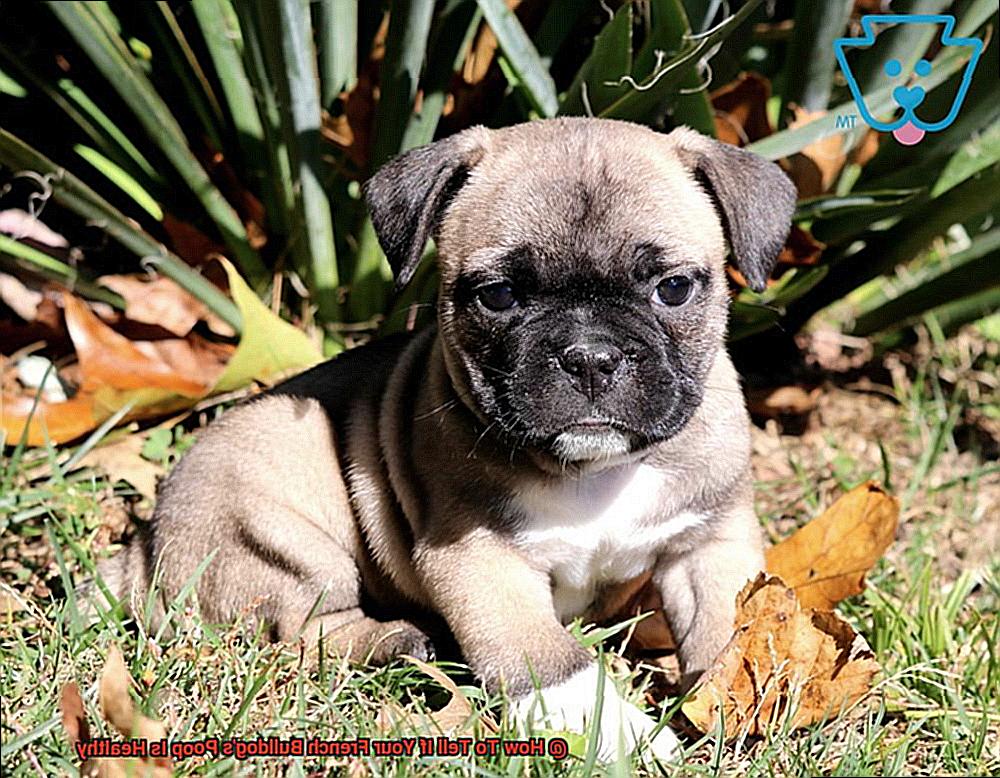
Exercise helps keep your French Bulldog’s digestive system functioning properly, so make sure they get plenty of walks and playtime every day.
Keep Their Living Space Clean
Nobody likes living in a cluttered house, particularly not your furry friend. Keep your French Bulldog’s living space free of any feces that may be present in the area to prevent any infections or illnesses from occurring.
Prevent Parasites
If left untreated, parasites can cause serious health problems, so make sure to give your French Bulldog regular deworming treatments to discourage any parasites from entering their system.
Monitor Your Dog’s Poop
Pay close attention to your dog’s poop; it’s like a window into their wellbeing.
If you notice any changes in color, consistency, or odor then take them to the vet immediately for a checkup.
Provide Fresh Water
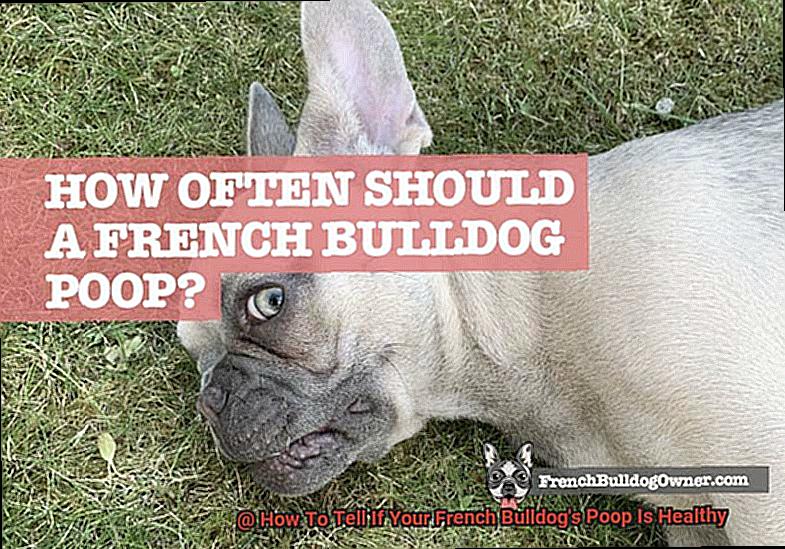
Just like people, dogs need lots of fresh water each day to stay hydrated and healthy – make sure your French Bulldog has access to plenty of fresh water at all times.
Clean Up After Them
Always clean up after your pup when they go outside – dispose of waste properly so that it does not end up polluting other areas or injuring other animals or people nearby.
Take Them To The Vet On A Regular Basis
Make sure you take your French Bulldog for regular check-ups and fecal tests at the vet so that you can be sure their poop is clean and free of any parasites or illnesses that could cause them harm down the line.
Is It Normal for French Bulldogs to Have Runny Poop?
Soft, liquidy, or runny stools can be a sign of something as simple as a dietary change or an upset stomach from eating something they shouldn’t have.
But if the issue persists for more than 24 hours, it could be a sign of a more serious health problem such as parasites, allergies, or infections.
It’s important to recognize what is normal for your Frenchie’s pooping habits.
Certain foods like high-fat diets, too much fiber, or foods that are difficult to digest can all cause runny stools.
So if you find that a change in their diet is the culprit, you may need to adjust their diet and/or switch to a higher quality food in order to get their stools back to normal.
Just like the ocean waves – sometimes your French Bulldog’s poop is calm and steady, other times it’s wild and unpredictable.
Although occasional runny poop is not uncommon among French Bulldogs, if you notice your pup has consistently liquidy stools for more than 24 hours, it may be time for a trip to the vet.
Conclusion
To wrap up, keeping an eye on your French Bulldog’s poop is essential for their health and happiness.
Healthy dog poop should be firm and well-formed, with a texture like Play-Doh.
It should also have a brownish hue and a light odor.
If you spot any changes that don’t look right, seek veterinary help immediately.
To keep unhealthy poops at bay, make sure they eat balanced meals, exercise regularly, keep their living space tidy, provide them with fresh water daily, clean up after outdoor potty breaks and get regular check-ups and fecal tests from the vet.
